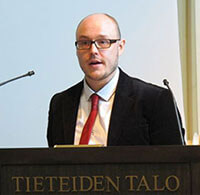Young Men were Expendable
|
| (and other papers on the sacrificial meaning of warfare) |
| Part IV: Rubenstein - Terrell |
|
| Richard L. Rubenstein (see below) was the first scholar to understand the meaning of the First World War. He noted that both German General Von Falkenhayn and British General Haig were convinced they had the “best of reasons” for permitting the “slaughter of their own troops.” They were chosen by political leaders because they were trusted to make the right decisions, and those decisions “were accepted.” Both the British and the German generals made the same decision: their country’s young men were expendable.
I gave a paper at a seminar on the First World War—in which I described how the young men were asked to get out of trenches and to run into machine-gun fire. One of the scholars participating was an expert on German brutality in waging war (see Isabel Hull’s Absolute Destruction). When I described what I believed was going on he said, “I don’t believe it. I don’t believe it.”
We know what we know (that the Generals were sending young men to die), but we don’t know it; or pretend we don’t know it; or don’t want to know it.
What will happen if we allow ourselves to know what we know?
Our understand of history changes forever. The world changes forever.
Richard Koenigsberg
Please take your time reviewing the list of items below.
Then click through to read any document. |
|
|
| Rubenstein, Richard L. |
| • |
The Cunning of History: The Holocaust and the American Future (Book) |
| |
Von Falkenhayn and Haig were convinced that they had the best of reasons for permitting the slaughter of their own troops. Both men had been entrusted by their countries with the most awesome of responsibilities. The process by which they were selected was neither frivolous nor fortuitous. They were regarded as the best their nations could elect. They were chosen because they were trusted to make the right decisions. Those decisions were accepted. Both the British and German generals made the same decision: their country’s young men were expendable. |
|
| Sagan, Eli |
| • |
At the Dawn of Tyranny (Book Excerpts) |
| |
So almighty were the kings of complex societies that they constantly exercised a prerogative that even Yahweh was not sure belonged to any creature, human or divine—the right to take human life in religious ritual. Human sacrifice was the ultimate certification of the power of early kings. On the island of Tahiti, ritual homicide makes kingship. Victims were killed for the greater glory of the prince royal. In fact, so apparently necessary was sacrifice to chiefly authority, that some chiefs, upon being urged by Europeans to give up the practice, exclaimed, "If we do there will be no Chiefs.” Society was intoxicated with the idea that some humans could become omnipotent, and the exercise of ritual homicide reinforced that dream. |
|
| Salimi, Rana |
 |
• |
Review Essay of Mark Schantz's Book Awaiting the Heavenly Country: The Civil War and America's Culture of Death |
| |
The political system of U.S. society in the Civil War era demanded that its citizens sacrifice their lives and commit violence against their fellow countrymen so the nation as a whole could survive. The dominant religious ideology of the time required citizens to voluntarily exchange the mundane world for the heavenly rewards of the afterlife. The individual could achieve the eternal life in heaven and could be commemorated as a hero if he was ready to sacrifice himself. |
|
| Seitz, David W. |
| • |
Silent Thunder: War Memorials and the Break Up of the Collectivistic Motive to Sacrifice (Paper) |
| |
"Through a discussion of the Silent Thunder Memorial for Freedom, a public memorial to American soldiers killed in the Iraq war, this essay examines how Western narratives of soldierly sacrifice have been deployed in American war memorials. I explore how American war memorials have worked as sites of closure that symbolically reorder, imply, but ultimately hide the horror of death in the battlefield. Although certain attributes situate the Silent Thunder Memorial for Freedom at a unique position within the long cultural tradition of American war memorials, this new memorial ultimately reverts to familiar notions of the ‘sacrificial soldier.’ In conclusion, I argue that events surrounding the Iraq war have rendered these notions dysfunctional, breaking apart the easy equation between the American war memorial and the memory of the sacrificial soldier." |
|
| Stalbank, Chris |
| • |
I'm Prepared To Give My Life For This Or Any Country (Article in The Onion) |
| |
As a true patriot, I would gladly die in battle defending my homeland. I love my country more than my own life. But I would also be more than willing to give my last breath in the name of, say, Mexico, Panama, Japan, or the Czech Republic. The most honorable thing a man can do is lay down his life for his country. Or another country. The important thing is that it's a country. The truth is, there are a lot of countries, each of which is the most noble cause possible to die for. I only regret that I have but one life to lose for but one country. |
|
| Strenski, Ivan |
 |
• |
Sacrifice: Bad Math, Bad Grammar |
| |
Sacrifice means loss, giving up, destruction and death. But, much talk about sacrifice carries on as if this loss, this subtraction, actually achieves addition. The soldier ‘sacrifices’ themselves in battle, but this doesn’t count as diminishment. It actually adds to whatever social body of reference is in play. So, the question is why and how can sacrifice add to the social whole, when, in the fact of destruction and death, it subtracts from the social whole, by removing one of its members from the body of the living? |
| |
• |
Sacrifice, Gift and the Social Logic of Muslim ‘Human Bombers’ |
| |
|
To understand Muslim ‘human bombers’, we must see them within the discourse of jihad, but also within that of ‘sacrifices’ and ‘gifts’. ‘Human bombings’ are not, therefore, simply matters of utilitarian military tactics, but are also religious and social as gifts, martyrdoms and sacrifices. This article proposes that we need to pay greater attention to the ‘sacrificial’ designations of these ‘human bombings’ as made by Muslims and which are rooted in Islamic discourse. |
|
| Tepora, Tuomas |
 |
• |
Redirecting Violence: The Finnish Flag as a Sacrificial Symbol, 1917-1945 |
| |
The glory attached to national flags often has been created by wars set in the heroic past. The sacrificial flag is a banner that periodically calls people to sacrifice themselves for the collective—and offers something in exchange. This can be a feeling of immortality, an intense identification with the collective resulting in the loss of individual boundaries, or simply a feeling of safety within a group sharing the same symbol, etc. National ceremonies around the flag commemorate past sacrifices and ritually re-establish the cohesion of the group. |
|
| Terrell, Robert |
| • |
Reading Death and Sacrifice in the Berlin Völkischer Beobachter (Paper) |
| |
Michael Geyer argues that by 1942 many Nazi leaders intentionally pushed the military toward mass death as a means of protecting and preserving Nazi ideology. In their romanticized view, to die on the rubble of one's dreams immortalized the dream itself. Men die but ideas live on. Furthermore, acts of sacrifice and sacrificial death became a marker of German identity. Sacrifice, as Geoffrey Cocks writes, was “proof of loyalty." The Berlin Völkischer Beobachter, the official paper of the Nazi Party, increasingly advocated the act of sacrificial death and promoted it as a means to achieve victory and immortality. |
|
|
|


